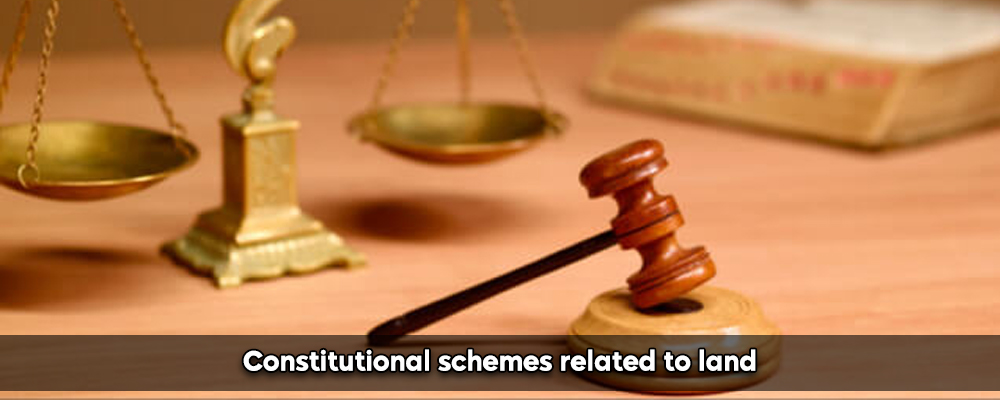According to the Indian Constitution, property is any proprietary interest that can be purchased, sold, or taken into one’s possession. In addition to being physical, it also consists of any collection of rights that the owner may use exclusively for themselves. The right to Property is defined in Article 19(1)(f). In Commissioner Hindu Religious Endowments v. Swamiar, the Supreme Court acknowledged that the right to property is also a tangible right. Previously, the Supreme Court had held that the right to property is just an abstract right and is not concrete.
Need A Legal Advice
The internet is not a lawyer and neither are you. Talk to a real lawyer about your legal issue

Constitutional schemes
- Laws pertaining to the acquisition of estates, temporary management of any property by the state in the public interest, amalgamation of two or more corporations either in the public interest or for their proper management, extinguishment or modification of any rights of managing directors, directors, or managers of corporations, or of any voting rights of shareholders thereof, or the extinguishment or modification of any rights accruing by virtue of any agreement are saved by Article 31 A.
- In order to shield some laws from judicial scrutiny, the constitution’s ninth schedule, or Article 31 B, was constructed. The original purpose of the legislation was land reform. Some of the subsequent laws, which are included in the ninth schedule, also dealt with other types of property.
- The fate of Article 31C was worse. No law giving effect to any of the directive principles of state policy would be void and no court could challenge any such law, notwithstanding anything contained in Article 13, according to this article, which was added by the 25th amendment in 1971 to lessen the impact of the Supreme Court judgment in the bank nationalization case of 1970.
Fundamental Right to Legal Right Transition
Not only did the country’s political climate shift in the wake of the emergency, but also the field of constitutional law. With the intention of removing “the impediments to the growth of the Constitution,” the Constitution (42nd Amendment) Act of 1976 made extensive amendments to the Constitution. The revisions were made to clarify the lofty ideals of secularism, socialism, and democracy, to broaden the scope of Directive principles, and to give them priority above fundamental rights.
The Act of 1976 expanded the application of Section 31(c) to include all Directive Principles that should take precedence over basic rights. In addition, Part IV received three additional articles: 39 A, 43 A, and 48 A. In the Minerva Mills case, it was contested once again, and the Act was ruled to be unconstitutional to the extent that it gave Directives primacy. The right to property was first included in Article 19(1)(f) of the Indian Constitution, which stated that all people shall have the right “to acquire, hold, and dispose of property,” along with Article 31, which provided certain safeguards against the compulsory acquisition of individual properties and was based on Sec. 299 of the Government of India Act, 1935. Regarding the relevant constitutional provision, Art. 19(1)(f) was subject to reasonable limitations under Art. 19(5).
The 42nd Amendment Act changes were requested to be repealed once the Janta Government assumed control of the Centre. When the 44th Amendment Act of 1978 was passed, it made one of the biggest changes possible by eliminating the right to property as a basic right and replacing it with Art. 300-A, which recognised it as a legal right.
In Jilubhai Nanbhai Khachar v. State of Gujarat, the Supreme Court defined the parameters of Art. 300-A and declared that the right to property does not constitute the fundamental framework of the Constitution. The word “property” in Article 300-A must also be considered in the context of the State’s sovereign right of eminent domain.
The Supreme Court has said that the right to property is now recognised as not simply a constitutional or legislative right but also a human right, rejecting the long-standing Doctrine of Adverse Possession as being against the rights of the genuine owner. As a result, the tendency is obvious. The derogatory word socialist that was added to the Preamble in 1977 must be removed by 2050 if the Indian Constitution is to be credited with a sense of sensibility and flexibility in keeping with the times, and the Right to Property must return to its original status as a Fundamental Right.
For land related matters, it is advisable to consult a land lawyer or a damage lawyer. Online data, legal services, and free legal advice online are all offered by Lead India. Ask a legal question and talk to a lawyer is the best course of action in this situation.





 Talk to a Lawyer
Talk to a Lawyer